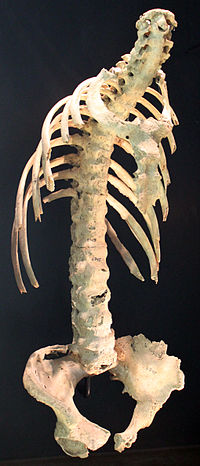
Photo from wikipedia
Objective To summarise the literature on the assessment of competences in postgraduate medical training. Methods A systematic literature review was performed within a EULAR taskforce on the assessment of competences… Click to show full abstract
Objective To summarise the literature on the assessment of competences in postgraduate medical training. Methods A systematic literature review was performed within a EULAR taskforce on the assessment of competences in rheumatology training and other related specialities (July 2019). Two searches were performed: one search for rheumatology and one for related medical specialities. Two reviewers independently identified eligible studies and extracted data on assessment methods. Risk of bias was assessed using the medical education research study quality instrument. Results Of 7335 articles in rheumatology and 2324 reviews in other specialities, 5 and 31 original studies were included, respectively. Studies in rheumatology were at variable risk of bias and explored only direct observation of practical skills (DOPS) and objective structured clinical examinations (OSCEs). OSCEs, including clinical, laboratory and imaging stations, performed best, with a good to very good internal consistency (Cronbach’s α=0.83–0.92), and intrarater reliability (r=0.80–0.95). OSCEs moderately correlated with other assessment tools: r=0.48 vs rating by programme directors; r=0.2–0.44 vs multiple-choice questionnaires; r=0.48 vs DOPS. In other specialities, OSCEs on clinical skills had a good to very good inter-rater reliability and OSCEs on communication skills demonstrated a good to very good internal consistency. Multisource feedback and the mini-clinical evaluation exercise showed good feasibility and internal consistency (reliability), but other data on validity and reliability were conflicting. Conclusion Despite consistent data on competence assessment in other specialities, evidence in rheumatology is scarce and conflicting. Overall, OSCEs seem an appropriate tool to assess the competence of clinical skills and correlate well with other assessment strategies. DOPS, multisource feedback and the mini-clinical evaluation exercise are feasible alternatives.
Journal Title: RMD Open
Year Published: 2020
Link to full text (if available)
Share on Social Media: Sign Up to like & get
recommendations!